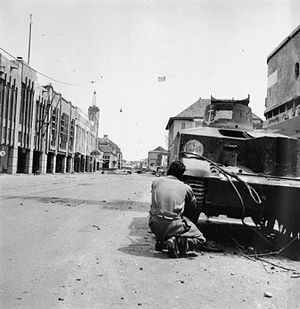| Battle of Surabaya | |||||||||
|---|---|---|---|---|---|---|---|---|---|
| Part of the Indonesian National Revolution | |||||||||
 A British Indian soldier takes cover behind a knocked-out Indonesian nationalist militia-modified Universal Carrier against enemy gunfire in a main street in the East Javan city of Surabaya, November 1945. | |||||||||
| |||||||||
| Belligerents | |||||||||
|
| |||||||||
| Commanders and leaders | |||||||||
| Units involved | |||||||||
|
| ||||||||
| Strength | |||||||||
| 30,000[1] | ||||||||
| Casualties and losses | |||||||||
|
6,300[2]–15,000[3] dead 20,000 wounded |
295[4]–2,000[1] dead 210 wounded | ||||||||
The Battle of Surabaya (Indonesian: Pertempuran Surabaya) was a major battle in the Indonesian National Revolution fought between regular infantry and militia of the Indonesian nationalist movement and British and British Indian troops against the re-imposition of Dutch colonial rule. The peak of the battle was in November 1945. The battle was the largest single battle of the revolution and became a national symbol of Indonesian resistance.[2] Considered a heroic effort by Indonesians, the battle helped galvanise Indonesian and international support for Indonesian independence. 10 November is celebrated annually as Heroes' Day (Hari Pahlawan).
By the time British forces arrived at the end of October 1945, the Pemuda ("youth") foothold in Surabaya City was described as "a strong unified fortress".[5] Fighting broke out on 30 October after the British commander, Brigadier A. W. S. Mallaby was killed in a skirmish.[5] The British retaliated with a co-ordinated sweep that began on 10 November, under the cover of air attacks. Although the colonial forces largely captured the city in three days, the poorly armed Republicans fought for three weeks, and thousands died as the population fled to the countryside.
Despite the military defeat suffered by the Republicans and a loss of manpower and weaponry that would severely hamper Republican forces for the rest of the revolution, the battle and defence mounted by the Indonesians galvanised the nation in support of independence and helped garner international attention.
For the Dutch, it removed any doubt that the Republic was not simply a gang of collaborators without popular support. It also had the effect of convincing Britain that wisdom lay on the side of neutrality in the revolution; within a few years, in fact, Britain would support the Republican cause in the United Nations.[2]